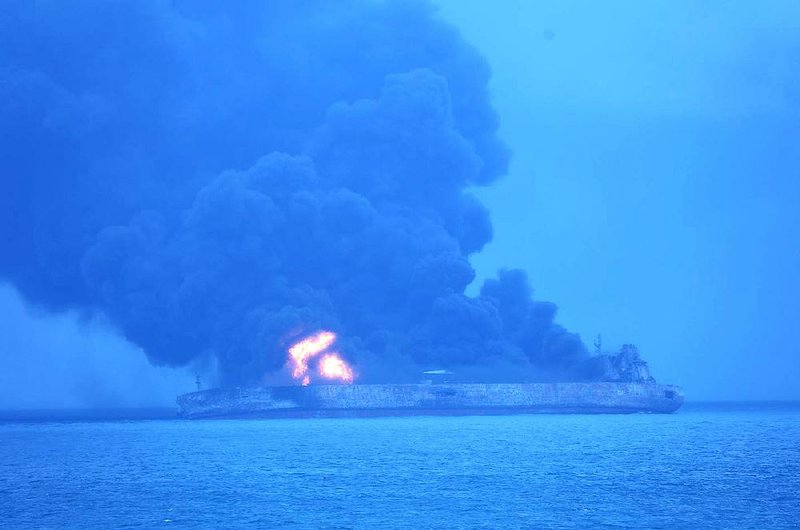BEIJING -- An Iranian oil tanker sailing to South Korea collided with a bulk freighter and caught fire off China's east coast, leaving the tanker's entire crew of 32 missing and causing it to spill oil into the sea, authorities said Sunday.
Chinese authorities dispatched police vessels and three cleaning ships to the scene after the collision, which happened late Saturday. In an article, Xinhua, the Chinese state-run news agency, said China had also sent eight search-and-rescue vessels while Shanghai's Fire Department sent experts to advise on combating the fire.
South Korea sent a fixed-wing plane and coast guard vessel to help search for the missing crew members -- 30 Iranians and two Bangladeshis.
The U.S. Navy, which sent a P-8A aircraft from Okinawa, Japan, to aid the search, said late Sunday that none of the missing crew had been found.
The Panama-registered tanker Sanchi was sailing from Iran to South Korea when it collided with the Hong Kong-registered freighter CF Crystal in the East China Sea, 160 miles off the coast of Shanghai, China's Ministry of Transport said.
All 21 crew members of the Crystal, which was carrying grain from the United States, were rescued, the ministry said. The Crystal's crew members were all Chinese nationals.
It wasn't immediately clear what caused the collision.
State-run China Central Television reported Sunday evening that the tanker was still floating and burning, and that oil was visible in the water.
It was not clear, however, whether the tanker was still spilling oil. The size of the oil slick caused by the accident also was not known.
A photo posted by China's state news media showed a large plume of black smoke rising from the waters behind a single ship amid low, overcast clouds.
The tanker Sanchi departed Iran's Assaluyeh port on Dec. 16 for Daesan in South Korea and was carrying 150,000 tons, or nearly 1 million barrels, of condensate, a type of ultra-light oil, according to Chinese authorities.
By comparison, the Exxon Valdez was carrying 1.26 million barrels of crude oil when it spilled 260,000 barrels into Prince William Sound off Alaska in 1989.
Iran, the third-largest oil producer in the Organization of the Petroleum Exporting Countries, sells most of its crude oil and condensate to Asia, exporting about 2 million barrels a day. Condensate is a light oil produced along with natural gas, mainly at Iran's offshore South Pars fields. The port of Assaluyeh is the main loading point for Iranian condensate.
The Sanchi has operated under five different names since it was built in 2008, according to the U.N.-run International Maritime Organization. The organization listed its registered owner as Hong Kong-based Bright Shipping Ltd., on behalf of the National Iranian Tanker Co., a publicly traded company based in Tehran. The National Iranian Tanker Co. describes itself as operating the largest tanker fleet in the Middle East.
An official in Iran's Oil Ministry, who spoke on condition of anonymity because he was not authorized to speak to reporters, said 30 of the tanker's 32 crew members were Iranians.
"We have no information on their fate," he said. "We cannot say all of them have died, because rescue teams are there and providing services."
The official said the tanker was owned by the National Iranian Tanker Co. and had been rented by a South Korean company, Hanwha Total Co. He said the tanker was on its way to South Korea.
Hanwa Total is a 50-50 partnership between the Seoul-based Hanwha Group and the French oil giant Total. Total did not immediately respond to a request for comment.
It's the second collision for a ship from the National Iranian Tanker Co. in less than a year and a half. In August 2016, one of its tankers collided with a Swiss container ship in the Singapore Strait, damaging both ships but causing no injuries or oil spill.
Information for this article was contributed by Gerry Shih, Amir Vahdat and Jon Gambrell of The Associated Press; by Ladane Nasseri and Anthony DiPaola of Bloomberg News; and by Paul Mozur of The New York Times.
A Section on 01/08/2018
